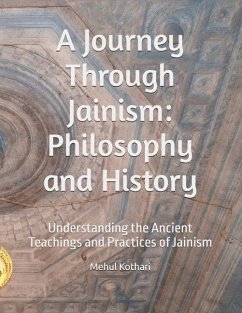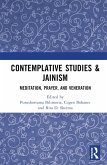Jainism, one of the oldest religions in the world, offers a profound philosophical framework for understanding the nature of existence, ethics, and the path to liberation. A Journey Through Jainism: Philosophy and History provides an insightful exploration of Jainism's teachings, practices, and rich historical background, guiding readers through its core principles and timeless wisdom. The book begins with an overview of Jainism's origins and history. Dating back over 2,500 years, Jainism was founded by Lord Mahavira, who is considered its 24th Tirthankara. The book traces the life of Mahavira and explores how his teachings on nonviolence (ahimsa), truth (satya), and asceticism became the foundation for Jain philosophy. It also delves into the evolution of Jainism, examining how it spread across India and influenced many aspects of Indian culture and society, including art, architecture, and social reform. The core principles of Jainism form the next focus of the book. Jainism is built upon five major vows-nonviolence (ahimsa), non-possessiveness (aparigraha), truthfulness (satya), chastity (brahmacharya), and non-stealing (asteya). These vows serve as a guide for both personal conduct and spiritual growth. The book explains the significance of each vow and how they contribute to leading a life of purity and self-discipline. Central to Jain philosophy is the concept of karma and the cycle of birth, death, and rebirth. The book offers a detailed explanation of how Jainism views the universe as eternal, with all living beings bound by karma. Jainism teaches that by following the path of righteousness and reducing one's karmic load, individuals can attain moksha, or liberation from the cycle of birth and death. The section on Jain rituals and practices introduces the daily life of a Jain practitioner, from meditation and prayer to the practice of asceticism. Jain monks and nuns follow a rigorous lifestyle, including strict dietary restrictions and the practice of self-restraint. The book also explores the importance of pilgrimage in Jainism, with sacred sites such as Palitana and Shatrunjaya serving as major destinations for followers seeking spiritual purification. The book further delves into the importance of nonviolence in Jainism, which is perhaps the most well-known aspect of the religion. Jain practitioners take great care not to harm any living being, including the smallest insects. This reverence for life extends to the environment, and Jainism is one of the earliest religions to promote ecological consciousness. The book highlights how Jains take active steps to minimize harm, including vegetarianism, careful farming practices, and protecting animals. A Journey Through Jainism also provides insights into Jain art, architecture, and literature. The beautifully adorned Jain temples and their intricate carvings reflect the deep spiritual connection that Jains have with their faith. Jain literature, such as the Agamas and Tattvartha Sutra, is also a vital part of the religion's teachings, offering wisdom on ethical living and spiritual practices. The book concludes by examining the relevance of Jainism in the modern world. Jainism's emphasis on nonviolence, self-discipline, and respect for all living beings resonates deeply with contemporary issues such as environmental sustainability, social justice, and personal well-being. Jainism's timeless wisdom continues to inspire individuals seeking a peaceful and ethical path in today's complex world. Through A Journey Through Jainism: Philosophy and History, readers gain a comprehensive understanding of one of the world's oldest and most profound religions, appreciating the depth of Jain teachings and their timeless relevance.
Bitte wählen Sie Ihr Anliegen aus.
Rechnungen
Retourenschein anfordern
Bestellstatus
Storno








